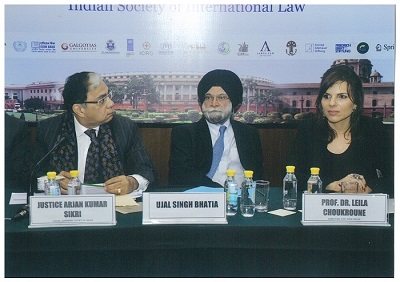With Judge Peter Tomka, President of the International Court of Justice (ICJ) as a guest of honour, as well as ICJ Judge Abdulqawi Ahmed Yusuf and Hon’ble Justice Shri Dalveer Bhandari (ICJ) as key participants, this year’s edition of the ISIL World Congress gathered a very large audience of international law scholars, practitioners and students for a 3 days fascinating discussion.
Building upon its expertise in international trade and investment law and its large network of world experts, the CSH directly contributed to the ISIL congress in putting together a very successful panel on the topical issue of “Judging the State in International Trade and Investment Law”. Conceived by Prof. Leïla Choukroune (Director of the CSH) and chaired by Justice Shri Arjan Kumar Sikri, Supreme Court of India and Mr A. Singh Bhatia, Member of the World Trade Organisation (WTO) Appellate Body, the CSH trade and investment panel brought together a variety of renown experts in the trade field with notably Pierre Sauvé (WTI, Bern), Prof. Julien Chaisse (Chinese University, Hong Kong), Prof. dr. Prabhash Ranjan (South Asian University), Prof. Denise Prévost (Maastricht University), Dr. Arthur E. Appleton (Appleton Luff) and Anuradha RV (Clarus Law Associates). These extremely rich ISIL – CSH discussions will soon be published in an edited book by Prof. Leïla Choukroune.
The ISIL-CSH trade and investment panel was also the occasion to launch Prof. Leïla Choukroune’s book series,
International Law and the Global South, published with Springer. While focusing on today’s law and international economic law in particular, the series brings together contributions from, or influenced by, other social sciences disciplines. In referring to the “rest of the world”, the book series puts forward new and alternative visions of today’s law from emerging and developing countries and authors who deliberately integrate this perspective into their thinking. The series approach is not only comparative, post-colonial or critical, but also truly universal in the sense that it places a plurality of well-informed visions at its center (
http://www.springer.com/series/13447).

